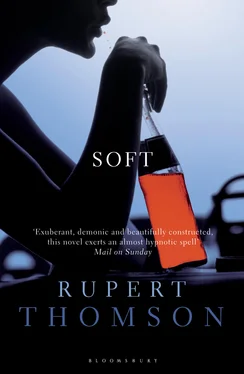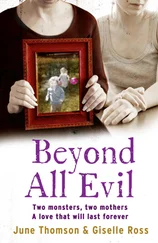At last they arrived at King’s Cross. He took Glade by the arm. ‘Our stop,’ he told her.
She looked at him, narrowing her eyes, and then she nodded. It was a habit of hers, making him wonder if she might be short-sighted.
As they left the carriage, Barker looked round, saw the woman watching them through the window. She would remember the encounter. She’d be able to say, ‘You know, I thought there was something strange about them.’ Only it would be too late by then. Yes, when she heard the news, she would remember. And then she’d probably blame herself. If only she had done something. There’d be guilt, huge guilt. But after what she’d put him through during the last ten minutes, Barker couldn’t pretend that he was sorry.
Upstairs, in the station, he asked for two singles to Hull. The man at the ticket counter told him it would be cheaper to buy returns. Super Savers, he called them.
‘But I’m not sure when we’re coming back,’ Barker said.
‘Still cheaper. Even if you never come back.’ The man watched Barker patiently, waiting for him to understand.
‘Super Saver,’ Glade murmured at his shoulder. ‘I like the sound of that.’
Barker looked down at her. She nodded, then drifted away from him, drawing glances from the people standing in the queue. Her height, her slenderness. Her bright-orange hair. He turned back to the man behind the counter.
‘OK,’ he said. ‘Two Super Savers.’
The tickets in his hand, he crossed the station concourse, stopping under the departures board. The train to Hull didn’t leave for another three-quarters of an hour. With Glade behaving the way she was, he thought it might be wise to delay boarding until the last minute. In the station, with all its freaks and misfits, all its strays, a girl muttering would be less likely to stand out.
Then Glade was pulling on his sleeve. ‘Have you got any money?’
‘Yes, I’ve got money,’ he said. ‘Why?’
‘Can I have some?’
‘What for?’
‘I’d like something to drink.’
‘I’ll buy you something.’
She looked at him knowingly, half-smiling, as if he was trying to trick her and she had seen through it. ‘I’d better come too,’ she said. ‘I’ll show you.’ She led him into the newsagent’s and down to the back where the soft drinks were kept. He watched her scan the cooler, her eyes jumping from one row of cans to the next.
‘That,’ she said, pointing.
‘Kwench!?’ He remembered noticing the same bright-orange cans lying on the floor in her kitchen.
‘Six of them,’ she said.
‘Six?’ He stared at her, over his shoulder.
She nodded. ‘I’m thirsty.’
He was looking into her face, which had an earnestness, a seriousness, that he had seen in children, and he realised, in that moment, that he would find it impossible to deny her anything.
‘Six,’ she repeated. In case he hadn’t heard her. In case he had forgotten.
He reached into the cooler, took out six cans of Kwench! and carried them up to the till.
‘I hope that’ll be enough.’ She was staring anxiously at the cans. She seemed to be making some kind of calculation.
‘You drink all these,’ he said, ‘we’ll get you some more.’
The cashier smiled at Glade indulgently. ‘Maybe you should buy the company.’
‘Sorry?’ Barker said.
The cashier turned to him. ‘You know, like in the advert.’
Barker had no idea what she was talking about.
Taking his change, he steered Glade out of the shop. The murmuring of voices, the distant drone of a floor-polisher. For one disconcerting moment he felt that he could actually see the sounds mingling in the air above his head like birds. Glade stopped and slid one hand into the plastic bag that he had given her to carry. She took out a can of Kwench! and opened it, then stood still, drinking fast. Her eyes glazed over, her body strangely disconnected, in suspension. It was as if swallowing the fizzy orange liquid required every ounce of concentration she could muster.
With twenty minutes still to go, he led her through the gate and out along the platform. They walked side by side, in no great hurry. He watched other passengers limp past with heavy cases, one shoulder higher than the other. Towards the front of the train he found an empty carriage. They sat at the far end, by the automatic door. There was no one opposite. Though Glade had quietened down since he had bought her those soft drinks, he had no way of knowing what she might do next. She had already started on her second can. She was drinking more slowly now and looking out of the window.
‘Is this Paddington?’ she asked.
‘No, it’s King’s Cross.’
‘Couldn’t we go from Paddington?’
‘The place we’re going to,’ he told her, ‘you can’t go from Paddington.’
She stared out into the draughty, half-lit spaces of the station. One of her hands rested on the table, holding her new can of Kwench!. The other rose into the air from time to time and traced the outline of her right ear, a gesture he remembered from the day that he first saw her.
‘There used to be a mountain in Paddington,’ she said after a while. ‘I don’t know whether you ever noticed it …’
He shook his head.
‘It’s another story you could have investigated,’ she said. ‘Another mystery …’ She sighed.
He looked across at her, her face turned to the window, her eyes staring into space and, once again, he wondered what she could possibly have done to warrant the attentions of a person like Lambert. He saw Lambert sitting in that restaurant near Marble Arch, his hands folded on the pale-pink tablecloth, the spotlit shrubbery unnaturally green behind his head, and suddenly he felt grateful to have been chosen. Yes, chosen. In a curious way, it was a blessing — a relief. If it hadn’t been him, it would have been somebody else, and he had known a few of them. They weren’t people who should be allowed anywhere near her. His job, as he now saw it, was to keep them away. For good. There was a sense, then, in which you could say that he was protecting her. He glanced at his watch. In less than eleven hours Lambert would be arriving in Bermondsey with a Scotsman and a video camera. Barker leaned back in his seat. He’d be far away by then. They both would.
Almost imperceptibly, the train began to glide out of the station. Thin sunlight filtered into the carriage. They passed signal boxes that were shedding paint, the flakes of white lying among the weeds and stones like brittle petals. They passed thickly braided electric cables, a workman with a spade balanced on his shoulder, a high brick wall the colour of a copper beech. Houses were visible against the sky. Their cream façades, their roofs of shiny, dark-grey tile. Parts of London he had never known, and couldn’t name …
Glade shifted in her seat, her face close to the window, one hand closed in a fist against her cheek. ‘No,’ she said softly. ‘No mountains here.’ She lifted the can to her lips and drank. She hardly seemed to taste the stuff as it went down. ‘Well,’ she said, ‘it was a long time ago.’
The train picked up speed, beat out a rhythm.
It was a long time ago. Empty cider bottles lined up along the skirting-board, unfurnished rooms, the music turned up loud. Ray had driven Barker to a house in Saltash. Over the Tamar Bridge, with alternating bars of light and shadow moving through the car. He could still see Ray in his black chinos and his red satin shirt with the ruffles down the front.
‘What kind of party is it? Fancy dress?’
Ray stared at him. ‘Why?’
‘Because you look like a Spanish waiter, Ray, that’s why.’
‘One of these days,’ Ray said, ‘you’re going to push me too far.’
Читать дальше












